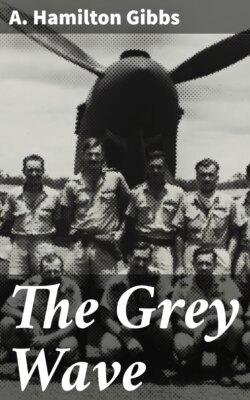Читать книгу The Grey Wave - A. Hamilton Gibbs - Страница 8
3
ОглавлениеTwo incidents stand out in that chrysalis stage of becoming soldiers.
One was a sing-song, spontaneously started among the gun sheds in the middle of the white moonlight. One of the recruits was a man who had earned his living—hideously sarcastic phrase!—by playing a banjo and singing outside public houses. He brought his banjo into the army with him. I hope he’s playing still!
He stuck his inverted hat on the ground, lit a candle beside it in the middle of the huge square, smacked his dry lips and drew the banjo out of its baize cover.
“Perishin’ thirsty weather, Bill.”
He volunteered the remark to me as to a brother.
“Going to play for a drink?” I asked.
He was already tuning. He then sat down on a large stone and began to sing. His accompaniment was generous and loud and perhaps once he had a voice. It came now with but an echo of its probable charm, through a coating of beer and tobacco and years of rough living.
It was extraordinary. Just he sitting on the stone, and I standing smoking by his side, and the candle flickering in the breeze, and round us the hard black and white buildings and the indefinable rumble of a great life going on somewhere in the distance.
Presently, as though he were the Pied Piper, men came in twos and threes and stood round us, forming a circle.
“Give us the ‘Little Grey ’Ome in the West,’ George!”
And “George,” spitting after the prolonged sentiment of Thora, struck up the required song. At the end of half an hour there were several hundred men gathered round joining in the choruses, volunteering solos, applauding each item generously. The musician had five bottles of beer round his inverted hat and perhaps three inside him, and a collection of coppers was taken up from time to time.
They chose love ballads of an ultra-sentimental nature with the soft pedal on the sad parts,—these men who to-morrow would face certain death. How little did that thought come to them then. But I looked round at their faces, blandly happy, dirty faces, transformed by the moon and by their oath of service into the faces of crusaders.
How many of them are alive to-day, how many buried in nameless mounds somewhere in that silent desolation? How many of them have suffered mutilation? How many of them have come out of it untouched, to the waiting arms of their women? Brothers, I salute you.
The other incident was the finding of a friend, a kindred spirit in those thousands which accentuated one’s solitude.
We had been standing in a long queue outside the Quartermaster’s store, being issued with khaki one by one. I was within a hundred yards of getting outfitted when the Q.M. came to the door in person and yelled that the supply had run out. I think we all swore. The getting of khaki meant a vital step nearer to the Great Day when we should cross the Channel. As the crowd broke away in disorder, I heard a voice with an ‘h’ say “How perfectly ruddy!” I could have fallen on the man’s neck with joy. The owner of it was a comic sight. A very battered straw hat, a dirty handkerchief doing the duty of collar, a pair of grey flannel trousers that had been slept in these many nights. But the face was clear and there was a twinkle of humorous appreciation in the blue eye. I made a bee-line for that man. I don’t remember what I said, but in a few minutes we were swapping names, and where we lived and what we thought of it, and laughing at our mutually draggled garments.
We both threw reserve to the wind and were most un-English, except perhaps that we may have looked upon each other as the only two white men in a tribe of savages. In a sense we were. But it was like finding a brother and made all that difference to our immediate lives. There was so much pent-up feeling in both of us that we hadn’t been able to put into words. Never have I realized the value and comfort of speech so much, or the bond established by sharing experiences and emotions.
